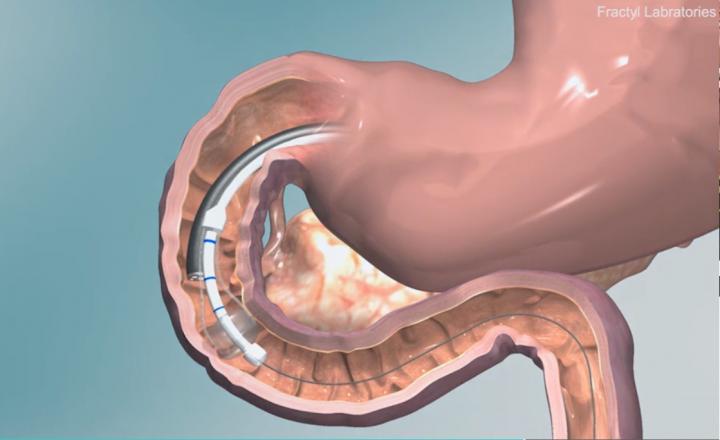Minimally invasive procedure could help patients control blood sugar

Credit: Fractyl Laboratories
HOUSTON – Jan. 17, 2019 — A same-day procedural therapy to improve glucose control for Type 2 diabetes patients will be investigated in a pilot study at The University of Texas Health Science Center at Houston (UTHealth). Absalon D. Gutierrez, MD, and Nirav C. Thosani, MD, are among the first physician-researchers in the country to assess the safety and effectiveness of The Revita™ System, designed to help improve blood sugar levels without the need for additional medications.
The RevitaSystem, a device created by Fractyl Laboratories Inc., is operated by a gastroenterologist for duodenal mucosal resurfacing (DMR), which is the modification of the lining in the uppermost part of the small intestine. The device consists of a console and a heated balloon catheter that is inserted transorally into the duodenum to break down its lining so it can regenerate and correct abnormal hormonal signaling and nutrient absorption.
“Recent studies on bariatric surgery have shown that prevention of nutrient contact with the duodenal mucosal surface results in a prompt and sustained insulin sensitizing effect, and DMR is designed to mimic that metabolic benefit,” said Gutierrez, the Houston principal investigator and assistant professor in the Division of Endocrinology, Diabetes and Metabolism at McGovern Medical School at UTHealth.
“Modifying the duodenal mucosa has the potential to alter the body’s ability to respond to sugar and restore metabolic health by targeting insulin resistance, a condition in which muscle, liver, and fat cells do not use insulin well,” Gutierrez said.
According to the Centers for Disease Control and Prevention (CDC), nearly 30 million Americans, including close to 3 million Texans, now have diabetes, a disease that causes high blood sugar. Type 2 diabetes affects 90 to 95 percent of all diabetes patients.
“Since Type 2 diabetes is the most common form of the disease, being able to treat it with a same-day procedure could be life-changing for so many of our patients,” said Gutierrez. “There are many drug therapies available, yet a majority of patients in the U.S. aren’t able to control their blood sugar. We’ve got to start considering alternative solutions, and I’m thrilled to be a part of the critical research.”
Poorly controlled blood sugar can lead to a variety of complications, including heart disease, stroke, high blood pressure, neuropathy, and glaucoma. According to the CDC, diabetes is also the leading cause of nontraumatic lower-limb amputations, kidney failure, and new cases of blindness among adults in the U.S.
The Revita DMR procedure aims to potentially prevent or even reverse disease progression for patients with diabetes and related conditions.
“Type 2 diabetes is a challenging illness to manage, in part because we’re not able to treat the underlying mechanisms of the disease,” said Thosani, co-investigator and associate professor in the Division of Gastroenterology, Hepatology and Nutrition at McGovern Medical School. “Instead of adding more drugs to the patient’s regimen, this intervention has the potential to help the body regulate glucose more efficiently on its own.”
The study is randomized and sham-controlled, meaning only some participants will receive the procedure. UTHealth and four other sites in the U.S. will enroll a total of 18 participants between 28 and 65 years of age. To be eligible, individuals must have been diagnosed with Type 2 diabetes for at least three years, have a body mass index ranging from 28 to 40 kg/m2, and an HbA1C of 7.5 to 9.5 percent.
For a full list of inclusion and exclusion criteria, visit ClinicalTrials.gov. If you are interested in enrolling in the study, please contact Prithvi Patil at 713-500-6677.
###
About UTHealth
Established in 1972 by The University of Texas System Board of Regents, The University of Texas Health Science Center at Houston (UTHealth) is Houston’s Health University and Texas’ resource for health care education, innovation, scientific discovery and excellence in patient care. The most comprehensive academic health center in the UT System and the U.S. Gulf Coast region, UTHealth is home to Jane and Robert Cizik School of Nursing, John P. and Kathrine G. McGovern Medical School, and schools of biomedical informatics, biomedical sciences, dentistry, and public health. UTHealth includes The University of Texas Harris County Psychiatric Center, as well as the growing clinical practices UT Physicians, UT Dentists, and UT Health Services. The university’s primary teaching hospitals are Memorial Hermann-Texas Medical Center, Children’s Memorial Hermann Hospital and Harris Health Lyndon B. Johnson Hospital. For more information, visit http://www.
Media Contact: Amy Laukka, [email protected], 713-500-3053
About Fractyl and Revita™ DMR
Fractyl Laboratories is a private medical technology company based in Lexington, Mass. Fractyl is developing Revita DMR, a same-day, minimally invasive procedure to treat two highly prevalent metabolic diseases: type 2 diabetes and NAFLD/NASH. The Revita DMR procedure harnesses breakthrough insights in the role of the duodenum in causing insulin resistance and metabolic diseases. Fractyl’s approach aims to improve the health of patients with metabolic diseases with device-based interventions for patients and healthcare systems. The Revita DMR System received a CE mark in the European Union in April 2016. It has been approved for investigational use by the Food and Drug Administration in the U.S. The Revita DMR System may be available for investigational use in other regions. For more information, visit http://www.
Corporate Contact: Lisa Davidson, Chief Financial Officer, Fractyl Laboratories Inc., [email protected], 781-902-8804
Media Contact: Jessica Yingling, PhD, Little Dog Communications Inc., [email protected], 858-344-8091
Media Contact
Amy Laukka
[email protected]
713-500-3053
Original Source
https:/




